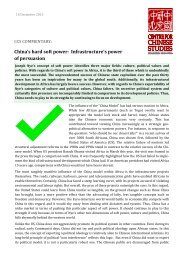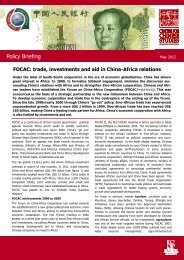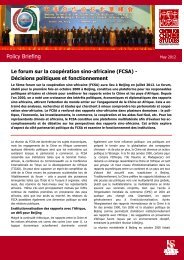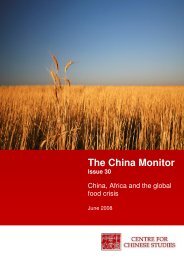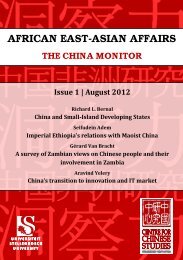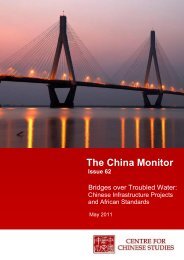The China Monitor - The Centre for Chinese Studies
The China Monitor - The Centre for Chinese Studies
The China Monitor - The Centre for Chinese Studies
You also want an ePaper? Increase the reach of your titles
YUMPU automatically turns print PDFs into web optimized ePapers that Google loves.
<strong>The</strong> <strong>China</strong> <strong>Monitor</strong><br />
April 2011<br />
rite of passage <strong>for</strong> the men (and increasingly women as well) of these villages to<br />
spend at least some time overseas. <strong>The</strong>y choose to immigrate and try their luck<br />
overseas. Young people from these areas are under social pressure to go out into<br />
the world and return successful. Migration, then, becomes a measure of one‟s<br />
courage, worth, and success; it has become culturally valued.<br />
`<br />
<strong>The</strong> growth of overseas <strong>Chinese</strong> enterprises in South Africa actually creates a<br />
demand <strong>for</strong> labour and thus encourages, via social and economic networks, further<br />
labour migration from <strong>China</strong>. <strong>The</strong> <strong>Chinese</strong> practice of hiring other <strong>Chinese</strong> nationals<br />
has to do with trust rather than pure ethnicity; in other words, workers are recruited<br />
amongst relatives or family friends who are known and trusted. <strong>The</strong>ir <strong>Chinese</strong><br />
nationality is not the key factor. It is said that in rural South Africa, almost 80% of the<br />
more recent <strong>Chinese</strong> migrants are from the Fuqing region of Fujian province. Many<br />
of the Fujianese businessmen rather encourage their children to do the business<br />
than asking them to go to college.<br />
Despite huge risks and challenges increasing numbers of <strong>Chinese</strong> migrant are<br />
choosing to cover long distances <strong>for</strong> various African destinations. Potential short and<br />
medium-term financial gains appear to outweigh very real dangers and difficulties.<br />
Areas of origin within <strong>China</strong>, types of migrant, migration patterns, and migration<br />
paths are increasingly diverse.<br />
Perceived challenges to <strong>Chinese</strong> migrants in South Africa<br />
Policeman and the security problem in South Africa are the most serious problem<br />
the <strong>Chinese</strong> business had to face. <strong>Chinese</strong> of the latest wave of migrants report bad<br />
relation with the local police. One of the reasons is that some of the <strong>Chinese</strong><br />
migrants are illegal entrants to South Africa; they have not identified nor do they<br />
have a work permit. Consequently, they became an object of extortion. Almost every<br />
<strong>Chinese</strong> businessman interviewed has experienced extortion from Johannesburg<br />
police. Over 90% <strong>Chinese</strong> migrants thought that police have a negative impact on<br />
their business, including those who have received their South African<br />
documentation.<br />
Chen Fenglan is a researcher<br />
from Fuzhou University, <strong>China</strong>.<br />
She recently participated in a<br />
joint research project between<br />
Stellenbosch University’s <strong>Centre</strong><br />
<strong>for</strong> Regional and Urban<br />
Innovation and Statistical<br />
Exploration (CRUISE), the CCS<br />
and Xiamen University, looking<br />
at <strong>Chinese</strong> migrant populations<br />
in Johannesburg<br />
Another big challenge to <strong>Chinese</strong> migrant is the feeling or experience of insecurity.<br />
Many of the interviewees mentioned <strong>Chinese</strong> experiences with robbery in South<br />
Africa. More than fifty <strong>Chinese</strong> migrants were killed during armed robberies between<br />
2007 and 2010. Some <strong>Chinese</strong> stated that “South Africa is a heaven except <strong>for</strong> the<br />
crime”. Numerous earlier <strong>Chinese</strong> migrants have left South Africa due to security<br />
concerns; some have returned to <strong>China</strong> while others have migrated further to<br />
Canada, Australia, and other developed Western countries. <strong>The</strong> more recent<br />
migrants, <strong>for</strong> their part, seem to increasingly adapt to local circumstances; some<br />
have learnt local languages and have begun to adopt local customs. <strong>The</strong>se adaptive<br />
strategies combined with hard work might help them overcome local barriers to<br />
economic and social success.<br />
End Notes<br />
1 This paper is drawn from field research undertaken by researchers from Fuzhou<br />
University and Stellenbosch University‟s <strong>Centre</strong> <strong>for</strong> Regional and Urban Innovation<br />
and Statistical Exploration (CRUISE), facilitated by the CCS, between December<br />
2010 and January 2011. <strong>The</strong> social survey covered <strong>Chinese</strong> populations in various<br />
parts of Johannesburg, namely: Cyrildene, Dragon City, <strong>China</strong> Mart, <strong>China</strong> City,<br />
Bruma Oriental City, Omendo City and African Trade City. Researchers completed<br />
502 questionnaires in total.<br />
© <strong>Centre</strong> <strong>for</strong> <strong>Chinese</strong> <strong>Studies</strong>, Stellenbosch University; All Rights Reserved<br />
11



